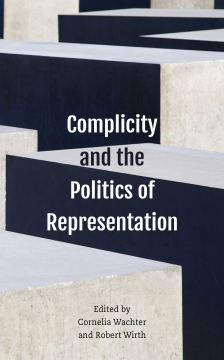
Additional Information
Book Details
Abstract
This book explores the concept of complicity with regard to the politics of representation. Over the past decades, complicity critique has evolved and become integral to literary and cultural studies. Nonetheless, the concept of complicity remains fundamentally underresearched. Addressing topical and exigent concerns such as white supremacy, war and displacement, child abuse and mentalism, this timely volume explores how producers, texts, consumers and critics can either intentionally or unwittingly become complicit in the creation and perpetuation of social harm – and how the structures supporting such complicities can be resisted. The contributors aim to raise awareness and lay the groundwork for a utopian ‘radical unfolding’ that enables not just non-complicity, i.e. the refusal to be complicit, but anti-complicity – the active and collective resistance to social harm.
Cornelia Wächter is Assistant Professor of British Cultural Studies at the Ruhr University Bochum, Germany. She is the author of Place-ing the Prison Officer: The ‘Warder’ in the British Literary and Cultural Imagination (Brill, 2015) and co-edited Middlebrow and Gender, 1890-1945 (Brill, 2016) with Christoph Ehland.
Robert Wirth is a Research Assistant in the Department of English and American Studies at the University of Paderborn, Germany, lecturing in English Language and British Cultural and Literary Studies.
Table of Contents
| Section Title | Page | Action | Price |
|---|---|---|---|
| Contents | v | ||
| Acknowledgments | vii | ||
| Chapter 1. Introduction: Complicity and the Politics of Representation | 1 | ||
| Chapter 2. The Chapters | 9 | ||
| Part I. NARRATIVE COMPLICITIES AND COLLECTIVE REMEMBERING | 25 | ||
| Chapter 3. Complicit Configurations: Narrating the Partition of India in Auden, Madhvani, and Brenton | 27 | ||
| Chapter 4. Complicity on the Small Screen: Ordinary Germans as Perpetrators in Recent German TV Miniseries on World War II and the Holocaust | 43 | ||
| Chapter 5. Literary Complicity and the Differend: Naturalizing, Ontologizing, and Self-Referential Representations of National Socialist Persecution | 57 | ||
| Chapter 6. Guilt and Autonomy in Harmann Broch’s and Geoffrey Hill’s Works | 75 | ||
| Chapter 7. An Illusion of Absence: The Picturesque and Culpable Ignorance in Kazuo Ishiguro’s The Remains of the Day and The Buried Giant | 89 | ||
| Part II. ENFOLDINGS AND UNFOLDINGS | 105 | ||
| Chapter 8. A Radical Unfolding: Utopianism against Complicity | 107 | ||
| Chapter 9. Complicity: Narratives, Articulations, and the Politics of Representation | 121 | ||
| Chapter 10. A Murmur of Indifference to Authorial Identity in Intellectual Life | 139 | ||
| Chapter 11. “I spy with my little eye something complicitly simple”: Eighteenth-Century Caricature Tricks | 159 | ||
| Part III. NARRATIVE COMPLICITY CRITIQUES | 175 | ||
| Chapter 12. The Black Counter-Gaze: Complicity and White Privilege in Claudia Rankine’s Citizen | 177 | ||
| Chapter 13. Challenging Complicity in the Context of Mentalism: Mental Distress Autobiographies and Performance Art | 195 | ||
| Chapter 14. Representation of Complicity with Child Sexual Abuse in the Movies: Spotlight and Doubt | 217 | ||
| Chapter 15. “. . . to understand everything that came her way”: Complicity and the Child Protagonist | 229 | ||
| Works Cited | 245 | ||
| Index | 267 | ||
| About the Contributors | 271 |
